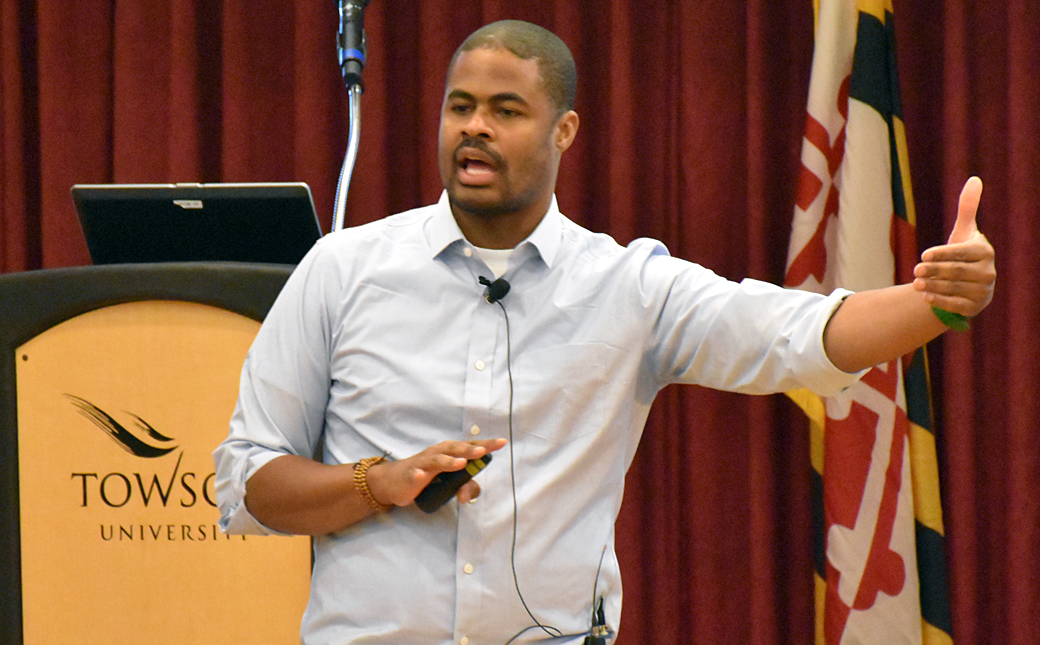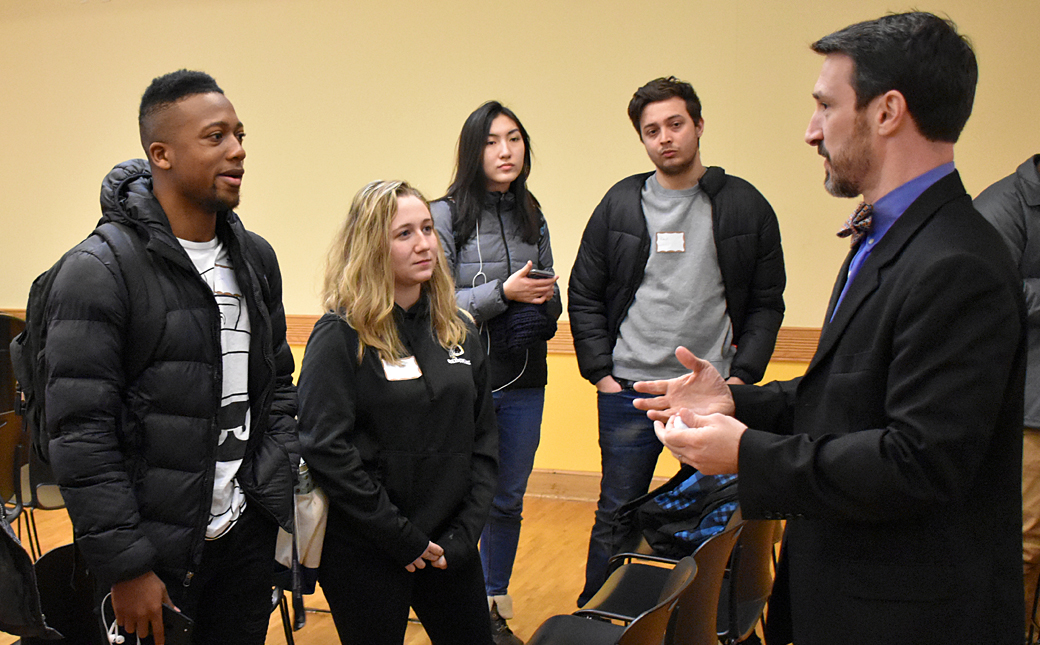In the time of big data
During the annual Badolato Speaker Series, national expert says understanding big data is key to the future of homeland security.
By Arthur Smith on March 9, 2018

When anything happens in a city, from the sanitation department picking up trash to someone tweeting about a rat sighting, a data point is collected.
That was how Amen Ra Mashariki began his presentation at Towson University’s Edward V. Badolato Distinguished Speaker Series on Thursday.
In 2015, two outbreaks of Legionnaires' disease, a deadly type of pneumonia caused by the inhalation of water vapor containing the Legionella bacteria, in New York City killed seven people and infected dozens more. The outbreak was being spread through cooling towers on top of buildings.
At the time, Mashariki served as chief information officer for New York City under Mayor Bill de Blasio. As the city’s data expert, Mashariki guided numerous projects at the Mayor's Office of Data Analytics, including the response to the two Legionnaires’ disease outbreaks.
Mashariki’s office was tasked with using data to identify the location of cooling towers so that they could be cleaned and sanitized—a difficult task considering there are more than one million buildings in New York City—and ultimately end the Legionnaires' disease outbreak.
“My team worked 20-hour days for three weeks straight, sleeping on the office couch in four-hour shifts, to push out data sets to first responders,” Mashariki said. “We looked at tax break data. We looked at building codes and other data sources to rule out hundreds of thousands of buildings.”
“Our data collection and analysis empowered on-the-ground expertise. Live data creates smart information that a city can act on. Overtime, the city slowly shifts,” Mashariki said.
Mashariki was formerly a White House fellow and the chief technology officer for the U.S. Office of Personnel Management in the Obama administration. Today, he serves as urban analytics lead at Esri, an international supplier of geographic information system software, where he focuses on data analytics and smart cities.
The changing idea of homeland security

Joseph Clark, assistant professor and program director for Towson University’s Integrated Homeland Security Management, spoke about the changing idea of homeland security.
In the aftermath of 9/11, the United States was reacting to the worst terrorist attack in the nation’s history. Just months after the attack, the Transportation Security Administration was created to help guard the nation’s airports. The Department of Homeland Security was created in 2002 to prepare for, prevent and respond to domestic emergencies, particularly terrorism.
“Programs such as [Towson University Integrated Homeland Security Management] also began popping up on college campuses,” Clark said. “Because we were reacting to a terrorist attack, a lot of the responses were based on counter-terrorism. After Hurricane Katrina hit, many programs began focusing on counter-terrorism and major disaster response.”
Clark noted that homeland security officials at the local and national levels are trying to shift the idea of homeland security from a focus on these large-scale events to one of every day threats.
“As I talk to homeland security officials, we are now realizing that most of the threats we face today are day-to-day threats,” Clark added. “Chances are we won’t be victims of a major terrorist attack. We are more likely to be a victim of an outbreak of measles or an automobile accident, for example.”
For instance, today officials are thinking about how homeland security can affect cities in regards to the health of its citizens, including the design of schools.
“If you’re in Oklahoma, schools are built to survive an EF 4 tornado. This isn’t the case in Maryland. We might be thinking about schools on the Eastern Shore being built to withstand hurricane force winds,” Clark said. “A lot of the country is now having conversations about how to design schools in regard to gun safety and violence.”
This changing idea has also shifted the concept of the Badolato Speaker Series.
Using data to understand the unknown unknowns
After 9/11, the Department of Homeland Security invested in fusion centers in large cities. These centers identified the need to collect data over time from disparate sources to better understand how data can be used to protect against future threats.
Everything that is happening in a municipality can possibly be a data point that can be useful and shared with these fusion centers.
“I would like to think that a lot of the work we did in New York City, whether it was using data about cooling towers to prevent New Yorkers dying from Legionnaire’s disease or looking at route times of school buses, will help protect our cities,” Mashariki said.
Mashariki paraphrased a famous quote by Former Secretary of Defense Donald Rumsfeld, “There are known knowns, things we know we know; there are known unknowns, some things we do not know; and unknown unknowns, things we don’t know we don’t know.”
Mashariki extended the idea.
“Cities get killed by the unknown unknowns. The same as the country as a whole. Any of this work around data moves us further out of the unknown unknown and at the very least into the known unknowns.”
The Edward V. Badolato Distinguished Speaker Series is endowed by the late Colonel Edward V. Badolato, USMC. Badolato graduated from Towson University and served under former Presidents Ronald Reagan and George H.W. Bush as deputy assistant secretary of the Department of Energy, specializing in counter-terrorism and emergency planning. Colonel Badolato was an internationally recognized expert in the field of energy and environmental operations, contingency planning and emergency response.
This story is one of several related to President Kim Schatzel's priorities for Towson University: TU Matters to Maryland, BTU: Partnerships at Work for Greater Baltimore and Strategic Plan Alignment.